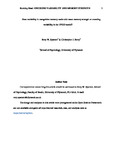Does variability in recognition memory scale with mean memory strength or encoding variability in the UVSD model?
| dc.contributor.author | Spanton, Rory | |
| dc.contributor.author | Berry, Christopher | |
| dc.date.accessioned | 2022-09-29T09:50:20Z | |
| dc.date.issued | 2022-10-22 | |
| dc.identifier.issn | 1747-0226 | |
| dc.identifier.issn | 1747-0226 | |
| dc.identifier.uri | http://hdl.handle.net/10026.1/19659 | |
| dc.description.abstract |
The unequal variance signal detection (UVSD) model of recognition memory assumes that the variance of old item memory strength (σo) is typically greater than that of new items. It has been suggested that this old item variance effect can be explained by the encoding variability hypothesis. However, Spanton and Berry (2020) failed to find evidence for this account, suggesting that σo may simply scale with mean memory strength (d) in the UVSD model. Experiments 1 and 2 examined the effects of encoding variability and strength scaling on old item variance by creating conditions in which mean memory strength and variability in item characteristics was either low or high in 2 × 2 factorial designs. In Experiment 1, overall strength determined estimates of σo, with no effect of item characteristic variability. The same effect of overall strength was found in Experiment 2; there was also a significant effect of item characteristic variability, although this manipulation also had some effect on d and was therefore partially confounded. Experiment 3 similarly found a simultaneous increase in old item variance and memory strength in a design using mixed item characteristic variability conditions in a single study/test block. We conclude that old item variance increases with mean memory strength in the UVSD model, with uncertainty about the effects of encoding variability, and that future explanations of the old item variance effect should bear this in mind | |
| dc.format.extent | 2037-2052 | |
| dc.format.medium | Print-Electronic | |
| dc.language | en | |
| dc.language.iso | en | |
| dc.publisher | SAGE Publications | |
| dc.rights | Attribution 4.0 International | |
| dc.rights.uri | http://creativecommons.org/licenses/by/4.0/ | |
| dc.subject | Encoding Variability | |
| dc.subject | Memory Strength | |
| dc.subject | Recognition Memory | |
| dc.subject | Strength Scaling | |
| dc.subject | Unequal Variance | |
| dc.title | Does variability in recognition memory scale with mean memory strength or encoding variability in the UVSD model? | |
| dc.type | journal-article | |
| dc.type | Journal Article | |
| plymouth.author-url | https://www.webofscience.com/api/gateway?GWVersion=2&SrcApp=PARTNER_APP&SrcAuth=LinksAMR&KeyUT=WOS:000889181900001&DestLinkType=FullRecord&DestApp=ALL_WOS&UsrCustomerID=11bb513d99f797142bcfeffcc58ea008 | |
| plymouth.issue | 9 | |
| plymouth.volume | 76 | |
| plymouth.publication-status | Published | |
| plymouth.journal | Quarterly Journal of Experimental Psychology | |
| dc.identifier.doi | 10.1177/17470218221136498 | |
| plymouth.organisational-group | /Plymouth | |
| plymouth.organisational-group | /Plymouth/Faculty of Health | |
| plymouth.organisational-group | /Plymouth/Faculty of Health/School of Psychology | |
| plymouth.organisational-group | /Plymouth/REF 2021 Researchers by UoA | |
| plymouth.organisational-group | /Plymouth/REF 2021 Researchers by UoA/UoA04 Psychology, Psychiatry and Neuroscience | |
| plymouth.organisational-group | /Plymouth/Users by role | |
| plymouth.organisational-group | /Plymouth/Users by role/Academics | |
| dc.publisher.place | England | |
| dcterms.dateAccepted | 2022-09-20 | |
| dc.rights.embargodate | 2022-10-25 | |
| dc.identifier.eissn | 1747-0226 | |
| dc.rights.embargoperiod | Not known | |
| rioxxterms.versionofrecord | 10.1177/17470218221136498 | |
| rioxxterms.licenseref.uri | http://creativecommons.org/licenses/by/4.0/ | |
| rioxxterms.type | Journal Article/Review | |
| plymouth.funder | Models of Explicit and Implicit Memory: Linking Priming, Recognition, and Source Memory::ESRC |



